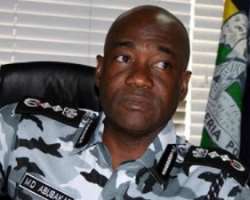Confronting spectre of killer squad – Punch

It is no revelation to say that political power contest is often bloody, whether within political parties or among them, in the country. As Nigerians prepare for another presidential election in 2015, fears already abound that violence will spike as it has been doing in the previous polls since 1999. Yet, not many people factored in the possibility of a return to state-sponsored violence as part of the unfolding power contest. Troublingly, this is one of the grave allegations a former President, Olusegun Obasanjo, levelled against the Goodluck Jonathan administration in an 18-page letter that has just been made public. It is a matter of life and death and should be fully investigated.
To many, especially in the Presidency, Obasanjo's letter cataloguing the ills currently plaguing the nation, should not be taken as anything serious beyond an unwarranted distraction from a fading political figure still fighting hard to preserve his relevance. But much as the Presidency would wish that the letter should be ignored in its entirety, it would be a mistake to think that it can be wished away, given the weighty nature of its contents, especially those bordering on the security of the nation.
Among other things, which may be of little or no interest to the apolitical, Obasanjo, in his letter, accused Jonathan of 'keeping over 1,000 people on political watch' and 'training snipers and other armed personnel secretly and clandestinely acquiring weapons to match for political purposes like (the late Gen. Sani) Abacha and training them where Abacha trained his own killers.' If it is true, Obasanjo warned, it cannot augur well for the initiator, the government and the people of Nigeria.
So far, the official response to the weighty allegations has been lethargic. Apart from describing the letter as 'self-serving, hypocritical, malicious, indecent, and very disrespectful of the highest office in the land,' the Special Adviser to the President on Media and Publicity, Reuben Abati, said the 'President himself will, at the appropriate time, offer a full personal response to the most reckless, baseless, unjustifiable and indecorous charges levelled against him and his administration by the former Head of State.' It is a promise that must be kept.
Nigeria is a country run by a corrupt and brutal oligarchy. For those who can easily recall its catalogue of horrors, life during the dark days of the Abacha regime, with the series of state-sponsored killings that characterised it, is not what anyone would wish for the country again. It was a period when bombings were experienced in unusual places, and snipers got a free rein to showcase their skills, with the resultant loss of valuable lives of citizens.
Nigeria has had her fair share of state-sponsored terrorism, spanning a period well before the advent of the Abacha regime and right into the civilian administration of Obasanjo himself, during which many unresolved murders, believed to be state-sponsored, occurred.
It is necessary to recall the murder in cold blood of Pa Alfed Rewane, in his residence in Lagos and many others like the Ibadan-based female politician, Suliat Adedeji; the bombing to death in Kaduna of a journalist, Bagauda Kaltho, who was later framed as the bomber; the broad daylight shooting and killing of MKO Abiola's wife, Kudirat, in Lagos; the shooting of Toyin, the son of Abacha regime's Attorney-General and Minister of Justice, Olusoga Onagoruwa; and the killing of Rear Admiral Babatunde Elegbede (retd).
There were also the attempted murders of the National Democratic Coalition chieftain, the late Abraham Adesanya; and the late publisher of The Guardian, Alex Ibru. While Adesanya escaped with his life intact, but with the windscreen of his car shattered, Ibru had to be flown abroad for treatment to save his life. He, however, lived the rest of his life with just one functional eye, having lost the other to the gunmen who were after his life. These were some of the high profile killings of citizens that defined the Abacha era. Not surprisingly, they were either politicians opposed to Abacha or those who had been working with him but had reasons to later fall out with him.
But even when it was thought that, with the passage of the military regimes, the last had been seen of such acts of gratuitous waste of lives, it still continued when the civilian government of Obasanjo took over in 1999. Prominent Nigerians such as the Lagos politician, Funso Williams; the sitting Attorney-General and Minister of Justice, Bola Ige; and South-South politicians, Harry Marshall and Aminasaori Dikibo, were among the casualties of the Obasanjo era. Most of them were killed right at their homes while their killers vanished without trace. But the evil ball was set rolling with the murder through a letter bomb of a top journalist, Dele Giwa, in 1986, during the regime of Ibrahim Babangida.
So, what is happening again? Historically, governments that have lost legitimacy often resort to death squads to hold on to power. But it has never lasted. It should not be forgotten that the emergence of militancy and Boko Haram has also been traced to government sponsorship of private security outfits who, after being disengaged, later decided to take up arms against the society. This is why any allegation of training a death squad should be an issue of concern to Nigerians.
Since such a thing has happened before in the country, it is Jonathan's duty to reassure Nigerians that there is no such recrudescence. The main reason for the existence of government anywhere is to ensure the welfare and security of citizens. Otherwise, the tension raised by that allegation is never going to disappear, just like that.
